The educational materials listed on this page are about Pest Management.
Producers must control a wide range of insect, weed and disease pests that can disrupt the healthy growth of crops. Given increasing resistance to chemical control methods (including organic pesticides and natural pesticides) farmers are increasingly adopting multifaceted strategies to keep pests at bay. These strategies include the biological controls and cultural controls featured in integrated pest management (IPM) as well as traditional chemical and physical controls. Integrated pest management (IPM) uses a range of ecological strategies to prevent pest damage and resorts to the use of pesticides only when monitoring indicates such action is required to avoid economic loss. Whole farm pest management systems build upon the biological pest control approach of IPM systems by integrating ecological pest management practices into all aspects of crop production. Soil organic matter and nutrient management, tillage, crop rotation and field boundaries, borders and buffers all play an important role in both increasing crop pest resistance and reducing pest pressures. Weed control is a challenge on all types of farm operations. A successful weed management plan will vary depending on the type of operation and whether it is conventional or organic. Helpful practices in an integrated weed management plan may include chemical weed control (conventional and organic herbicides), the use of mulches (living mulch or cover crops, killed mulches, plastic mulch), tillage or cultivation, crop rotation, and more novel techniques such as soil solarization or using geese or goats for weed control.
SARE’s Manage Insects on your Farm addresses the principles of ecological pest management. A Whole Farm Approach to Managing Pests provides tips for designing whole-farm pest management solutions. Managing Cover Crops Profitably, Crop Rotations on Organic Farms and Steel in the Field also provide helpful insights into the roles cover crops, rotations and tillage can play in pest management.
Farmers need to understand disease management on the farm to employ effective plant disease control methods. Becoming familiar with crop diseases means utilizing myriad effective strategies to prevent and control diseases. Various integrated management practices control the spread of disease including biological control, physical control and cultural control. Chemical control may include synthetic fungicides, while organic producers rely on an organic fungicide or other natural fungicide to aid in crop protection. For example, disease management in tomatoes, which are susceptible to many diseases, includes the use of resistant cultivars, sanitation, sound cultural practices and fungicide for tomatoes. While there are many chemicals available for different crops, such as fungicide for grass or soybean fungicides, holistic or integrated approaches to disease management are also important tools for effective plant disease control. Key practices include integrated crop and livestock systems, crop rotation, utilizing disease resistant varieties and cultivars, cultural control, biological control, physical control, chemical control, and prevention.
Showing 1-10 of 52 results
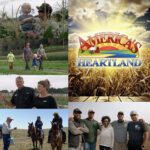
Farming Strategies for Adapting to Extreme Weather
SARE partnered with PBS KVIE to produce an episode of RFD-TV's America's Heartland that highlights how farmers and ranchers across the United States are using sustainable and regenerative practices to adapt to increasingly challenging and unpredictable weather conditions. Adapting to Flooding and Drought on Hurricane Flats Farm in South Royalton, Vermont Ashley Loehr and Antoine […]
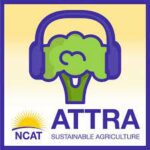
Growing New Markets for Specialty Crops
Voices from the Field is a podcast series co-produced by ATTRA and SARE that explores the different ways farmers are working to create new local markets for specialty and niche crops. Each partner episode will address a different production system or crop–from endives to small-grain value chains–and will feature farmers sharing their production and marketing […]
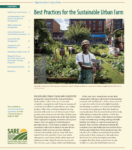
Best Practices for the Sustainable Urban Farm
For decades, urban farms and community gardens have helped meet the demand for fresh, local produce. Urban farms are diverse and adaptable, ranging from small farms on repurposed vacant lots to multilevel vertical farms and rooftop gardens. Often, they combine ecological farming practices with some form of infrastructure. Urban growers make clever use of their […]
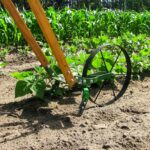
Choosing the Right Tools For Your Farm
A manual created by Ain Chike and Georgia Organics outlines hand tools, small engines, their utility descriptions and where to source them for growers in the Southeast. It allows readers to understand each tool and their practical uses. This short 4-page PDF acts as a overview for important tools to ensure efficient and productive yields […]
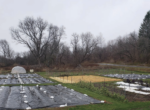
Tarping in the Northeast: A Guide for Small Farms
Reusable tarps, including black plastic (silage tarps), clear plastic and landscape fabric, are multi-functional, accessible tools that are increasingly popular on small farms. The use of opaque materials that block light is frequently called “occultation,” while the use of clear tarps is called “solarization.” The use of the word "tarping” is a general term to […]
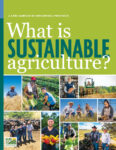
What is Sustainable Agriculture?
This award-winning report provides a sampler of best practices in sustainable agriculture—from marketing and community vitality to cover crops and grazing—as well as eight profiles of producers, educators and researchers who have successfully implemented them.

Leaders in Sustainable Agriculture Featured on America's Heartland
SARE partnered with PBS KVIE to produce an episode of RFD-TV's America's Heartland that features four farmers describing their commitment to sustainability, how they plan to meet farming challenges of today and tomorrow, and how SARE has impacted their farming and ranching practices. The full 24-minute video is available, as is each segment featuring the […]

Manage Weeds on Your Farm Video Series
In this series, experienced farmers from around the country talk about how they have found success controlling weeds by following ecological principles, and without resorting to the use of herbicides. To do so, they rely on a range of cultural and mechanical practices, including diverse crop rotations, well-timed cultivation and targeting weeds when they're at […]
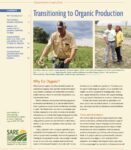
Transitioning to Organic Production
Transitioning to Organic Production lays out many promising conversion strategies, covering typical organic farming production practices, innovative marketing ideas and federal standards for certified organic crop production.
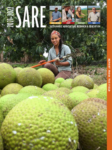
2021–2022 Report from the Field
Report from the Field features 12 stories from around the country of recent SARE grantees who are finding new ways to improve the sustainability of U.S. agriculture. The report also summarizes our total investment in research and education projects since 1988.